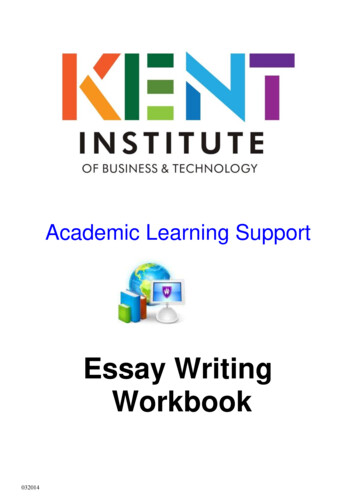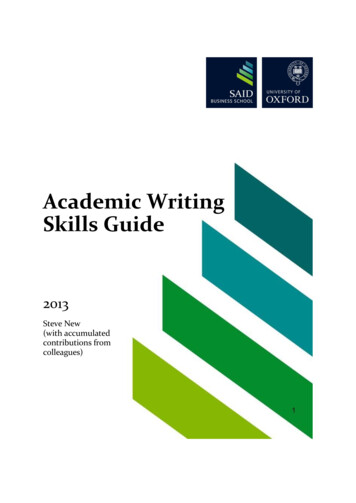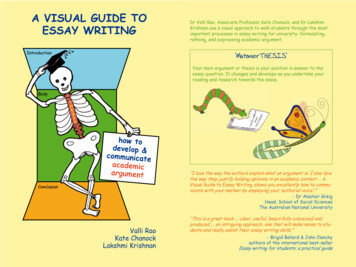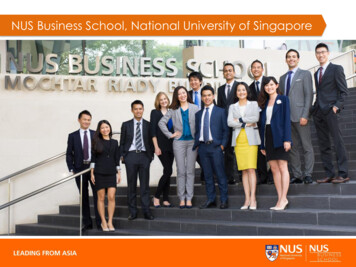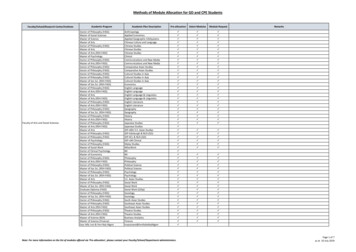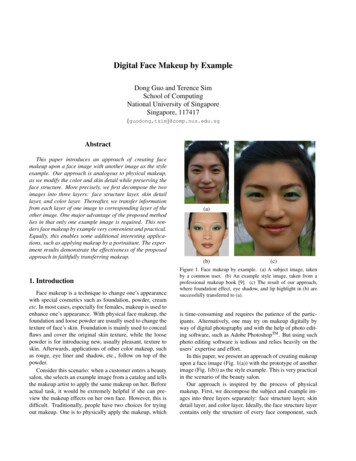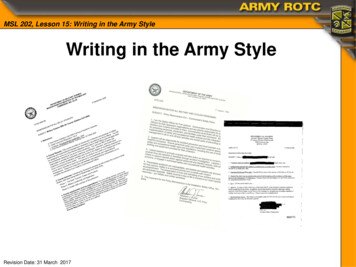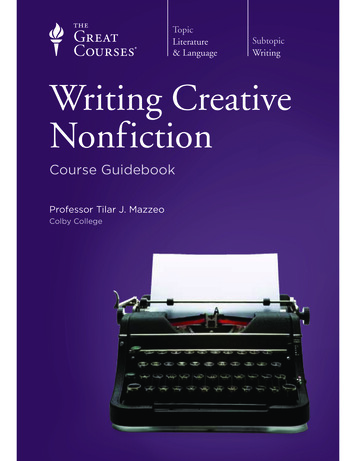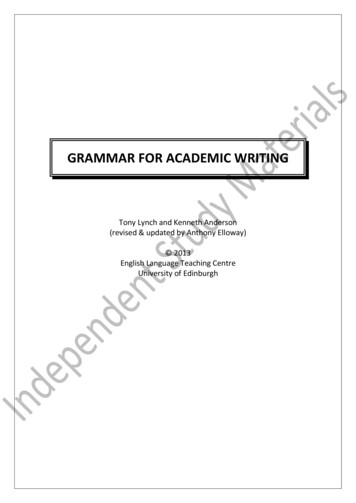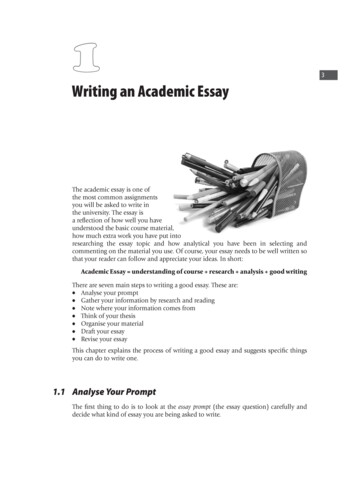
Transcription
13Writing an Academic EssayWriting an Academic EssayThe academic essay is one ofthe most common assignmentsyou will be asked to write inthe university. The essay isa reflection of how well you haveunderstood the basic course material,how much extra work you have put intoresearching the essay topic and how analytical you have been in selecting andcommenting on the material you use. Of course, your essay needs to be well written sothat your reader can follow and appreciate your ideas. In short:Academic Essay understanding of course research analysis good writingThere are seven main steps to writing a good essay. These are:Analyse your prompt Gather your information by research and reading Note where your information comes from Think of your thesis Organise your material Draft your essay Revise your essay This chapter explains the process of writing a good essay and suggests specific thingsyou can do to write one.1.1 Analyse Your PromptThe first thing to do is to look at the essay prompt (the essay question) carefully anddecide what kind of essay you are being asked to write.03-08 CUC SL.indd 37/12/09 10:13:15 AM
1.1.1 Define your purposeDifferent essay prompts require you to do different things. Some essays need you toexplain a concept, while others expect you to compare and/or contrast; yet others expectyou to argue a position. Table 1 shows the main essay prompts:Writing an Academic Essay4Table 1: Essay PromptsIf you are asked to Then you will need to AnalyseFind some systematic or methodical way of categorising ordefining a topic.Find the cause and effect of some phenomenon.Find the solution to a given problem.ArguePresent your thesis — that is your stand and the reasons forit and persuade the reader by the points that you raise.Compare and/or contrastFocus on similarities and/or differences in a topic.DiscussPresent your view of a topic; you need to choose your ownfocus.ExplainShow how well you understand a topic or phenomenon.1.1.2 Analyse the key words in the promptSome words are significant and will need to be defined as part of your essay. In theexample below, the key words are in bold:Surrogate motherhood should be legalised in all countries so that everyone has achance to have their own children. Discuss.You will need a working definition of surrogate motherhood and legalised. A workingdefinition is one that you will work with so you would choose one that suits yourthesis.1.1.3 Consider other important words in the promptThe other important words are ones which will affecthow you delineate or gather your essay points.You could pick up on the words all, everyone andown children. You may ask if surrogacy would suitall countries in the world or who is meant byeveryone — should these people includesingle people as well as couples and people ofdifferent sexual orientations? You may also askwhy it is important to have one’s own children.In short, analysing the prompt in detail willhave an impact on how you search for materialand how you select and analyse it later.03-08 CUC SL.indd 4The firstthingis to look to doatthe essay promptcarefullyanwhat kind d decideyou are b of essayeing asto write. ked7/12/09 10:13:15 AM
1.2 Gather Your Information by Research and ReadingTo gather information by reading, secondary research, you need to read selectively eitherfrom a recommended bibliography or read around the topic trying to ascertain whichinformation could be most useful to your essay.1.3 Note Where Your Information Comes From5Writing an Academic EssayGathering information through interview, questionnaire, survey or laboratory experiments is called primary research. It involves collection of data which does not exist yet.You should have a good idea of how your essay will develop before you begin so thatyou can look for the appropriate amount or scope of information.It is an academic convention to acknowledge your sources and to distinguish wheresource information ends and your own original thinking begins. It is the academic wayof showing that you are not plagiarising, i.e. stealing somebody else’s ideas, which isconsidered to be cheating. This particular convention is one of the key features thatdistinguishes an academic essay from other sorts of essays, for example, opinion piecesin newspapers. See Chapter 6: Using other people’s ideas for instructions on how to acknowledge your sources.As you research and read, keep careful notes about where your material comes from.You will need to know the author’s full name, the book or article title, the publisher,date and place of publication and any website details.1.4 Think of Your ThesisIt is now time to craft your essay. The most important idea in your essay is your centralidea, which is called a thesis. The thesis controls the entire essay — all your main pointswill be a development of it, and all the minor supporting details will illustrate it. Forthe example essay prompt above, one thesis statement might be:Surrogate motherhood is a useful method for conceiving children, but should only belegalised where it is culturally appropriate to do so and for a clearly specified group ofpeople.Make sure that the thesis expresses a controlling idea that is neither too broad nor toospecific to develop effectively and that it does not simply state the obvious. See Chapter 2: Developing an academic essay for more tips on how to construct a good thesisstatement.03-08 CUC SL.indd 57/12/09 10:13:16 AM
1.5 Organise Your MaterialA good essay is well-organised. It has a coherent structure that helps the reader makesense of the content. After gathering all the ideas, decide what to include in what orderand how to let the reader know you are moving from one point to another.Writing an Academic Essay6You will need to identify your main ideas and make sure you can support each onesufficiently with details.Drawing an outline can give you a good visual picture of the final essay. Work out anoutline that allows you to develop and support your thesis. This helps you to rememberwhen you will use which points of the information you have gathered. This is usefulin long academic essays to prevent you from digressing because of an interesting subpoint, which might lead to a rambling essay.Table 2 and Table 3 below show templates of two ways your essay might be organised:Table 2: Template for a discursive essayIn this sectionyou will Introduction Bodyparagraphs Conclusionprovide a topic sentence which says what the main point of eachparagraph isprovide supporting details for your topic sentence (based on your research)synthesise what you have read; that is, show what different people thinkabout the same pointshow some critical thinking; that is, tell the readers what you think of whatyou have read, andprovide in-text citations for your information. recap your main pointsreiterate your thesis, andgive your final word, if any. list the references for each of your in-text citations. Referencesgive brief background to the topicaddress definition of key words and issuesstate your thesisoutline your main points, andprovide transition into body paragraphs.tlineDrawing an ouucan give yoicturea good visual p y.of the final essa03-08 CUC SL.indd 67/12/09 10:13:16 AM
Table 3: Template for an argumentative essayIn this sectionyou will Introduction Bodyparagraphs Conclusion recap your main pointsreiterate your thesis, andgive your final word, if any. list the references for each of your in-text citations. Referencesprovide a topic sentence which says what the main point of eachparagraph isprovide supporting details for your topic sentence (based on your research)synthesise what you have read; that is, show what different people thinkabout the same pointshow some critical thinking; that is, tell the readers what you think of whatyou have readpresent some counterarguments, if you think they are strong ones, toshow you understand there is an opposing viewpoint, but provide a refutation showing that you have an argument against thatopposing viewpoint, andprovide in-text citations for your information.Writing an Academic Essay 7give brief background to the topicaddress definition of key words and issuesstate your thesisoutline your main pointsdelineate your argument showing what your stance is and how you willdevelop your ideas, andprovide transition into body paragraphs.1.6 Draft Your EssayUsing your outline, writeyour essay — get allyour thoughts down onpaper. It does not haveto be perfect first time.Use formal English andaim for an objective tone.Choose the most precisewords and aim fora fluent and coherent style.When you are referring tosources, paraphrase anduse reported speech ratherthan a lot of directquotation.03-08 CUC SL.indd 77/12/09 10:13:16 AM
1.7 Revise Your EssayRevision consists of two steps: editing and proofreading.Writing an Academic Essay8Editing is the process of reading through your essay again and asking how well organisedit is and how well your ideas are developed. Do you have an objective tone? Is yourchoice of words accurate? Is your writing concise? Are the links within and betweenparagraphs clear? See Chapter 3: Using appropriate words in an academic essay for advice on how to chooseappropriate words in order to achieve a formal and objective tone and provide clear linksbetween your paragraphs.The final step is proofreading your essay. Read through your essay slowly looking forobvious errors such as spelling, punctuation or grammar and correct them. It is easierto do this on a hard copy than a soft one. See Chapter 5: Proofreading an essay or report for guidelines for checking your essay.Before you submit, check if there are any specific submission details, such as the use ofa specific font size, margins or double spacing.ConclusionTo recap, an academic essay is the most common assessment of how much you havelearned and thought about a topic for your course work. It has certain features in termsof content (researched or well argued based on fact and logic), organisation (controlledby a thesis and by the type of essay prompt you are responding to), language (formaland objective), which you will find out more about in Chapter 3, and using academicconventions to acknowledge sources, as explained in Chapter 6. You need to selectinformation, synthesise it, and critique it. You should be prepared to write a first draftand to spend time improving it.Further readingAbrams, E. (2009). Essay structure. Retrieved on June 15, 2009, from http://www.fas.harvard.edu/ wricntr/documents/Structure.htmlDuffin, K. (2009). Overview of the academic essay. Retrieved on June 15, 2009, from http://www.fas.harvard.edu/ wricntr/documents/Overvu.htmlLee, K.C., Goh, H., Chan, J., & Yang, Y. (2007). Effective college writing: A process genre approach.Singapore: McGraw-Hill.The OWL at Purdue (2009). OWL materials: Creating a thesis statement. Retrieved on June 16, 2009,from Chapter contributed by LEE Gek Ling03-08 CUC SL.indd 87/12/09 10:13:16 AM
This chapter explains the process of writing a good essay and suggests specifi c things you can do to write one. 1.1 Analyse Your Prompt The fi rst thing to do is to look at the essay prompt (the essay question) carefully and decide what kind of essay you are bein
